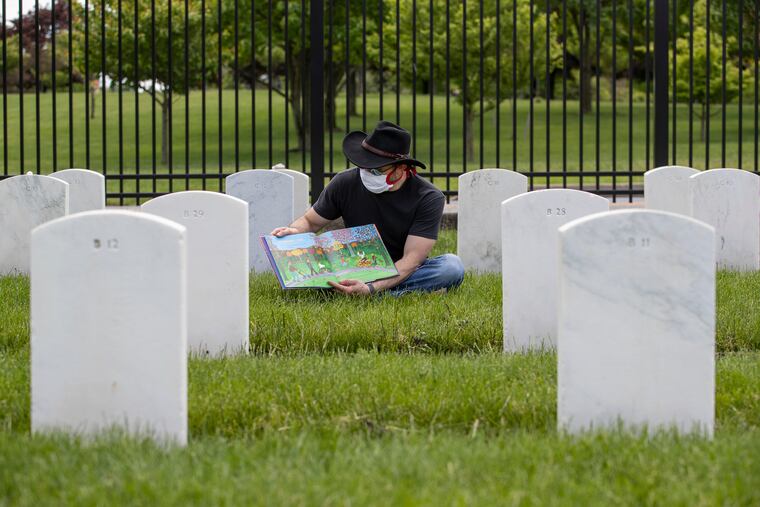An act of remembering Native American children who died so long ago
A group of Native Americans have come every Memorial Day weekend since 1973 to the cemetery of the Carlisle Indian Industrial School to honor the students who died while attending school there and to decorate their graves.

CARLISLE — Maj. Steven Brewer sat by the graves like a teacher reading a children’s story. The students were arranged in straight lines as if still seated at the school desks they occupied more than a century ago on the same grounds.
The site on Saturday was the cemetery of the Carlisle Indian Industrial School on the campus of the Army War College, where a group of Native Americans have come every Memorial Day weekend since 1973 for a vigil of sorts. They come to honor the students who died while attending school there and to decorate their graves.
The practice was started by the American Indian Society of Washington, D.C. and continued in recent years by the Circle Legacy Center of Lancaster.
Because of the coronavirus and a lock down on the military base, this year was different. Attendees were limited to those who had a military ID. A group that in past years normally numbered about 50 was reduced to eight this year because of restrictions intended to help stop the spread of the deadly virus.
It was up to Brewer, a non-Native American, Karen Collins, an Eastern Shawnee elder who helped originate the memorial practice, and Shawndae Sharp’s family to carry on the tradition.
Before the pandemic, Brewer’s family had intended to participate in the larger ceremony. His wife, Chelle McIntyre-Brewer, is of Arkansas Cherokee descent. Their children, Lorelei, 14, and Killian, 7, had started growing sage last June to dry and bundle for the event. But they could not be present to see their work used to decorate the 189 graves, 170 of them for Native American students.
Lorelei was born with a serious heart condition. To diminish possible exposure to COVID-19, the family, with the exception of Steven Brewer, who works in the Army health clinic at the Carlisle barracks, has quarantined inside their Duncannon home since March 3. McIntyre-Brewer says the lesson for their children is something they emphasize in the family: “It’s not always about you. Focus on someone else. It’s a lesson in humility.”
Brewer wanted to continue a tradition that Lorelei had started a year earlier of reading to the graves. The book that was chosen was We are Grateful: Otsaliheliga by Cherokee author Traci Sorell. The book teaches resilience and gratitude for the experiences of ancestors. “Last year, Lorelei sat in her wheelchair and read three stories and even took the time to hold the book out and show the pictures around,” Brewer recalled. “I wanted to make sure we did this. I know it was really important to her and it touched me seeing it.”
The cemetery has become a lasting symbol of the assimilation effort initiated by the United States government at Carlisle and later at other boarding schools.
Opened in 1879, it was the nation’s first federal off-reservation boarding school, created to solve “the Indian problem" by cleansing children of their “savage nature.” Thousands of Indian children were shorn of their names, languages, religions, and family ties.
About 8,000 students attended the Carlisle school during its 39-year history. Since 2017, 11 students have been disinterred and returned to their native lands. There will be no homecomings this year. Like many things, the pandemic has caused a postponement until next year.
“Even with those repatriated, it doesn’t mean we forget,” said McIntyre-Brewer. “There is still a memory of what happened and a memory that still needs to be reconciled with. We are still understanding a significant amount of loss.”
Staff writer Jeff Gammage contributed to this article.